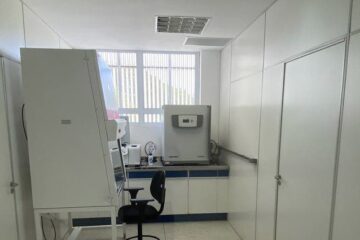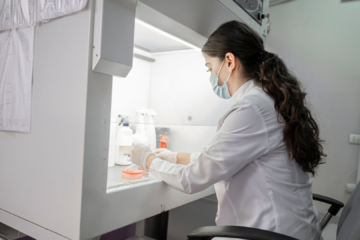Scientists aim to validate an innovative hypercholesterolemia hit
Carolina Barizan (1), Biomedical Scientist 1. Crop Biolabs
Researchers at the preclinical safety and efficacy testing laboratory, Crop Biolabs, have developed a platform to express therapeutic peptides for chronic diseases, which raised one million (BRL) in 2022.
Through this platform, the researchers have already obtained a possible new lead peptide for an oral hypercholesterolemia treatment, which inhibits the proprotein convertase subtilisin/Kexin type 9 (PCSK9). PCSK9 is a molecule involved in the degradation of cholesterol receptors in the liver, responsible for capturing low-density lipoproteins (LDL), known as “bad cholesterol”, from the bloodstream.
As a project supported by São Paulo Research Foundation (FAPESP), Innovative Research in Small Businesses Program (PIPE), Crop Biolabs received R$1,000,000.00 for the in vivo validation of the peptide effectiveness. To do so, the company established a partnership with São Paulo State University and the Experimental Research Unit (UNIPEX) in Brazil.
The development of the peptide started with computer models until the final version was developed. The molecular structure was designed based on other molecules already present in the human body. From there, modifications were added to optimize efficacy, target interaction, and oral bio absorption. According to Dr. Lucas Ribeiro, CSO of Crop Biolabs, “our goal is to make it an effective and orally delivered molecule”.
According to market studies, cholesterol-lowering drugs grow 3% a year and should reach a value of US$ 37.7 billion in 2027. The main drugs that exist today for this purpose are statins and monoclonal antibodies. Several pharmaceutical companies seek to develop an effective inhibitor against PCSK9, a fact highlighted by recent publications.
“As an organization whose mission is to bring science to people, this is a great opportunity for us to validate this orally delivered peptide against its molecular target,” said Aruã Prudenciatti, co-founder and CEO of Crop Biolabs.
The in vivo studies are scheduled to begin in early 2023 and the team expects to obtain their results this same year. From this, other validations will be carried out to achieve a robust proof of concept.
Scientists aim to validate an innovative hypercholesterolemia hit
Follow Crop´s news: https://www.linkedin.com/company/crop-biolabs/
Learn more about Crop Biolabs: https://cropbiolabs.com




